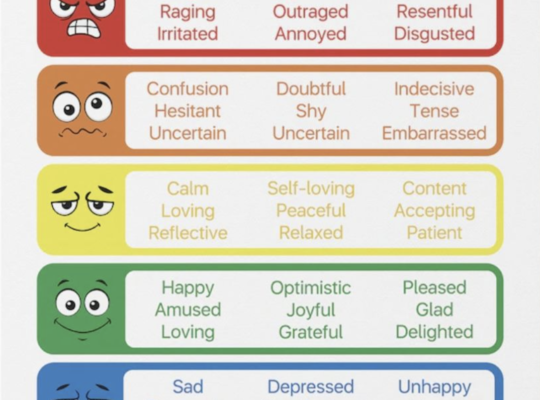
Objective self-awareness refers to a state where individuals focus their attention on themselves, evaluating their own thoughts, feelings, and behaviours in comparison to certain standards or norms. This type of self-awareness involves looking at oneself from an outside perspective, often through the lens of societal expectations, cultural norms, or personal ideals.
When someone is objectively self-aware, they may become more conscious of discrepancies between their actual behavior or beliefs and the standards they perceive. This heightened awareness can lead to self-evaluation and the motivation to adjust one’s actions or attitudes to align more closely with desired standards or values.
For example, if someone realizes they are not meeting their own expectations in terms of health habits, academic performance, or interpersonal relationships, they may feel compelled to make changes to improve themselves.
Self-awareness can be triggered by various factors, such as self-reflection, feedback from others, or exposure to situations that highlight one’s behavior. It plays a crucial role in personal growth, as it prompts individuals to consider how they are perceived by others and strive for self-improvement.
In the late 1800s, William James talked about two different kinds of self: the subjective and the objective self. Since then, many psychologists have been interested in understanding self-awareness (Brownell, Zerwas, & Ramani, 2007). They want to figure out when the self starts to develop, why it matters, and what it means for how we grow up.
From a developmental point of view, kids start to become aware of themselves around 18 months old (Brownell et al., 2007). This is when they begin to act more independently, which many parents notice during the “terrible twos.” They start to see themselves as separate from others and recognize their own reflection in mirrors. They also start saying “no” a lot. This is an example of subjective awareness.
Five levels of Self Awareness that happen in a child’s early life by the age of 4-5 years
Level 0 – Confusion. The child can’t tell the difference between themselves and their reflection.
Level 1 – Differentiation. The child starts to understand that the mirror shows the environment around them, but something’s different.
Level 2 – Situation. This is when the child starts to realize that their reflection is like them, but it’s outside their body.
Level 3 – Identification. The child starts to see that the reflection in the mirror is actually them.
Level 4 – Permanence. The child recognizes themselves in pictures and videos, even if it’s from when they were younger.
Level 5 – Self-consciousness or “meta” self-awareness. The child knows about themselves and how others see them.
Objective self-awareness, as the American Psychological Association (n.d.) explains, is when we pay close attention to ourselves. We compare ourselves to others standards or behaviours and then try to fix things about ourselves that don’t match up with what we want to be. When there’s a gap between who we are and who we want to be, we feel uneasy. So, we look to others to figure out how we can change You look at how you act, think, and feel in comparison to what’s considered normal or right. This kind of self-awareness comes from seeing yourself as others might see you.
According to Rochat (2003), objective self-awareness happens after level five of his stages. Self-regulation, which is how well we control our actions and impulses, is harder without objective self-awareness. People who can regulate themselves well are more likely to reach their goals and act the way they want to. You can find more tools for self-regulation here.
Duval and Wicklund
In 1972, Duval and Wicklund came up with the idea of objective self-awareness. They said that at any moment, a person might focus on themselves or on other things. They believed that when people focus on themselves, they compare themselves to certain standards.
These standards come from things happening around them. Once people take these standards inside, they might change their thoughts and actions. The more people focus on themselves, the more aware they become of who they are.
To test their ideas, they did some experiments. In one study, they wanted to see if people would change their opinions or how well they did something if they became more aware of themselves. They did three experiments and found that people did change (Wicklund & Duval, 1971).
People who were recorded, watched themselves on TV, or looked in a mirror while doing something became more aware of themselves. Their opinions matched certain standards (in experiments 1 and 2), or they did better at what they were doing (in experiment 3).
Duval and Wicklund’s research is important for today’s studies on self-awareness, especially objective self-awareness. Their work showed that it’s possible to study how much attention people pay to themselves using scientific methods (Morin, 2011).
Objective Self Awareness & Trauma
Self-awareness in the context of trauma involves recognizing and understanding one’s thoughts, feelings, and behaviors without bias or judgment, which can be challenging due to the impact of the traumatic event. Trauma disrupts a person’s sense of self-awareness by causing feelings of shame, guilt, or dissociation, making it crucial to maintain clarity amid such experiences. From a psychological perspective, objective self-awareness with trauma entails acknowledging the effects of the traumatic experience on one’s perceptions of oneself and others, identifying coping mechanisms, and understanding triggers associated with the trauma. Through cultivating objective self-awareness, individuals can begin to comprehend the ways in which trauma has shaped their lives and relationships, fostering self-compassion, acceptance, and growth as they navigate the complexities of trauma towards healing and resilience.
Objective Self Awareness in Family Systems
Objective self-awareness within a family system means understanding yourself from an outside perspective, especially in relation to your family members. It involves being aware of how your thoughts, feelings, and actions affect others in your family and how they perceive you. Objective self-awareness in the family system helps individuals recognize their roles, behaviors, and dynamics within the family unit. It involves understanding how family interactions and communication patterns influence one’s self-perception and relationships with other family members.
For example, being objectively self-aware in a family might mean recognizing patterns of communication or conflict resolution and understanding one’s own contribution to these dynamics. It can also involve acknowledging strengths and weaknesses within the family and how they impact individual and collective well-being. Objective self-awareness within the family system promotes healthier relationships, effective communication, and personal growth for each family member. It encourages individuals to reflect on their actions, consider the perspectives of others, and work towards positive change within the family unit.
Critical Aspect
Self-awareness is a critical aspect of personal development and growth. By focusing our attention on ourselves and comparing our thoughts, feelings, and behaviors to external standards or norms, we gain valuable insights into our actions and beliefs. This heightened awareness allows us to identify areas where we may fall short of our own expectations or societal ideals, prompting us to strive for self-improvement and alignment with our values. Objective self-awareness fosters accountability and empowers individuals to make intentional choices that lead to positive change and fulfillment.
To cultivate objective self-awareness, we can engage in practices such as self-reflection, seeking feedback from others, and exposing ourselves to diverse perspectives and experiences. Taking time to introspect and evaluate our thoughts and actions, soliciting constructive criticism from trusted sources, and being open to learning from different viewpoints all contribute to developing a deeper understanding of ourselves and our place in the world. Through these efforts, we can nurture a greater sense of self-awareness and embark on a journey of personal growth and self-discovery.









[…] Improving self-awareness involves trying different strategies tailored to your preferences and needs: […]
[…] empowering beliefs. By repeating affirmations regularly, individuals can challenge and change self-limiting beliefs, fostering a more optimistic and resilient […]
[…] thinking your own needs are […]
Mygreat learning For the reason that the admin of this site is working, no uncertainty very quickly it will be renowned, due to its quality contents.
Simplywall I very delighted to find this internet site on bing, just what I was searching for as well saved to fav
I am glad you loved and saved my blog!
FinTech ZoomUs I am truly thankful to the owner of this web site who has shared this fantastic piece of writing at at this place.
[…] encourages self-respect and independence. It is based on the belief that we deserve love and respect without losing ourselves. Setting healthy boundaries helps us keep our individuality and build mutual respect in […]